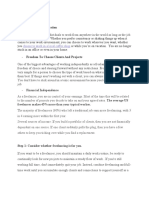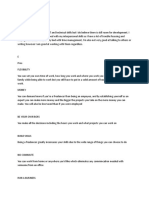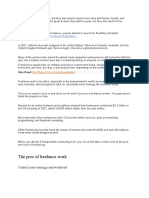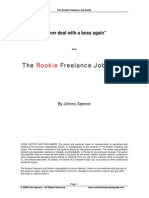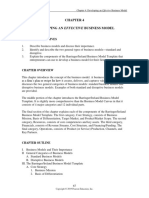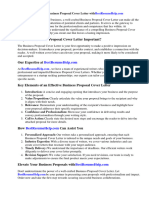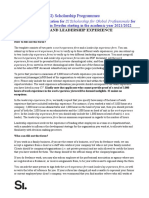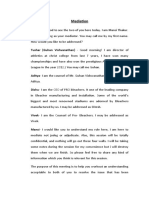1. You don’t get paid when you go on holiday or when you’re sick.
One of the disadvantages of freelancing is the lack of benefits you would
otherwise receive when working for a company.
However, when you become your own boss, you are much less likely to need
time off.
Stress is a huge contributor to poor health, and once this has been
eliminated—from not having to deal with that tyrant of a boss, the frustration
of working with incompetent colleagues, or the unhappiness caused by
working long hours trapped in a soulless office doing a job you hate—you are
statistically far less likely to get sick.
You’ll be doing a job you love and on your own terms, so that common cold
that was a good excuse to stay home before isn’t going to hold you back
when you’re running your own business.
If you do get ill, the higher salary you’ll be earning means you’re more
likely to have some savings put aside to cover for this. In terms of holidays,
because you can go as and when you want, you can book cheaper last-
minute deals or go away off-season when it’s considerably less expensive.
2. Your income will be irregular
Unlike a regular 9 – 5 job, your income as a freelancer will depend entirely on
the amount of work you do.
The good thing about this is that you are in control of how much you earn.
Someone working for a firm can’t suddenly decide to earn more money if
they want to, but you can!
If you find you’re short of money one month, you can take on more work,
increase your rates, accumulate more clients through your network, or put
out more inquiries.
If you have more than enough money, the next month, you take on less
work. Your finances are totally within your control.
3. Isolation
Work can be isolated from home, and this is one of the most significant
disadvantages of freelancing. You do not have interactions with
�management, personnel, or other employees as an independent employee
without employees. The isolation can be relieved through networking,
participation in professional associations, and social communication. Social
media networks like Twitter, LinkedIn, and Facebook are excellent tools for
connecting with others.
4.Lack of benefits
You do not receive employer-based benefits as an independent contractor,
such as holiday pay, medical insurance, 401 K, and other common benefits.
The disease time is non-existent, and insurance coverage may be expensive.
When you are self-employed, there is no paid sick time or holidays. You need
to create a backup plan in the event of a sickness a personal emergency, or
a vacation when you cannot serve your clients or meet time limits.
Self-employed people can be expensive because they cannot take advantage
of the volume discounts that are provided to large companies. Medical
conditions pre-existing may make it difficult to find coverage.
5. Some of your clients might be late payers.
Late-paying clients are an inevitability of a freelancer’s working life. But
there are things you can do to minimize the opportunities people have to pay
late before you’ve even committed to working with them. Prevention is
better than cure; making your position clear from the get-go could save a lot
of chasing up later.
So make sure your payment policies are clear on your original contract with
the client, then both parties know where they stand from the start.
Try to accept as many different forms of payment as possible so that the
client has no excuse not to pay. If you are able to include credit card
transactions in this list of possible ways to pay, do it.
Then a client can pay you even if they don’t currently have the funds
themselves. It is also possible to ask for part of your payment before you
start working for the client, e.g. 30% when the contract is signed, 30% after
an agreed point, and 30% on completion of the project.
�That way you are securing a steady income for yourself throughout the time
it takes you to do the project as well as after. It is also possible to withhold
the project until you receive your final installment.
6. Tax consequences
An additional self-employment tax is applicable as an independent
contractor. Since you don’t have taxes deducted from customer checks, an
independent contractor must pay an estimated tax every quarter if its year’s
tax liability exceeds $1,000. All your expenditures should also be carefully
recorded.
Final words
It will change one’s life to decide to become a freelance person, and
as such, it is not an easy decision to take. You will only decide if the
freelancing life is right for you. The only thing you can do for
yourself is to sit and closely discuss all the benefits and
disadvantages of freelancing if you start immersing yourself in
freelancing. It is maybe time to hop in if you think the benefits
outweigh the risks. But perhaps the time to take the world of full-
time freelance is not yet ripe if the risks sound too high for you.

















